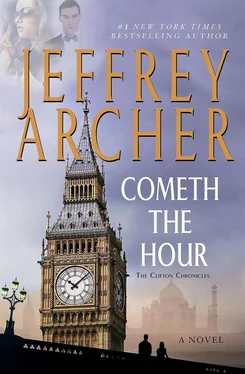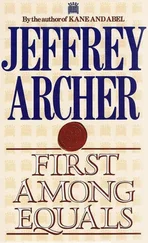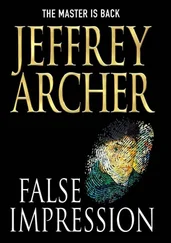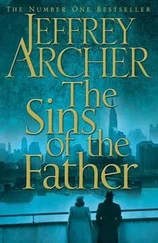“How often do you lose?”
“About one game in ten. But then, it’s a hobby, Mr. Gray, not a profession.”
Mr. Bishara, how much money would you have made if you’d been able to dispose of thirteen ounces of heroin?”
“I had no idea until I saw the charge sheet, which estimated a street value of around twenty-two thousand pounds.”
“How much profit did your bank declare last year?”
“Just over twenty million pounds, Mr. Gray.”
“And how much do you stand to lose if you are convicted in this case?”
“Everything.”
“No more questions, my lord.” Mr. Gray sat wearily down. To Sebastian, he didn’t look like a man who believed the odds were in his favor.
“Members of the jury,” said the judge, “I am now going to release you for the weekend. Please do not discuss this case with your families or friends, as it is not them, but you, who must decide the fate of the accused. On Monday I shall be inviting leading counsel to make their closing speeches before I sum up. You will then retire and consider all the evidence before you reach your verdict. Please make sure you are back in your places by ten o’clock on Monday morning. I hope you all have a peaceful weekend.”
The four of them gathered in Gilbert Gray’s chambers.
“What are you up to at the weekend, Mr. Clifton?” Gray asked as he hung up his wig and gown.
“I was going to the theatre, to see Evita, but I don’t think I can face it. So I’ll just stay at home and wait for my daughter to call me reverse charges.”
Gray laughed.
“And you, sir?” asked Seb.
“I have to write my closing address and make sure I cover every single point Carman raised. How about you, Arnold?”
“I’ll be sitting by the phone, Gilly, just in case you need me. Dare I ask how you feel it’s going?”
“It doesn’t matter how I feel, as you well know, Arnold, because everything is now in the hands of the jury who, I must warn you, were very impressed by Mrs. Bergström’s testimony.”
“How can you be so sure of that?” asked Ross.
“Before she stepped into the witness box, several members of the jury were looking in Hakim’s direction from time to time, which is usually a good sign. But since she gave evidence, they’ve hardly even glanced at him.” Gray let out a long sigh. “I think we must prepare ourselves for the worst.”
“Will you tell Hakim that?” asked Seb.
“No. Let him at least spend the weekend believing innocent men are never convicted.”
It would be a long weekend for Sebastian, Ross, Arnold, Victor, Clive, Mr. Gray and Mr. Carman, as well as for Desmond Mellor and Adrian Sloane — and an endless one for Hakim Bishara.
Sebastian woke early on Saturday morning, after catching moments of intermittent sleep. Although it was still dark outside, he got up, put on a tracksuit and jogged to the nearest newsagent. The headlines in the rack outside the shop didn’t make good reading.
MYSTERY WOMAN’S UNHELPFUL EVIDENCE
( The Times )
£10,00 °CASH FOUND IN HEROIN BAG
( Daily Mail )
BISHARA CAUGHT SMUGGLING £14,000 WATCH INTO UK
( Sun )
The Sun even had a picture of the watch on its front page. Seb bought a copy of every paper before he made his way back to his flat. After he’d poured himself a cup of coffee, he sank back into the only comfortable chair in his living room and read the same story again and again, even if the angle taken was slightly different. And by reporting Mr. Carman’s damning words in inverted commas, the journalists were all able to steer well clear of the libel laws. But you didn’t have to read between the lines to work out what they considered the verdict was likely to be.
Only the Guardian offered an unbiased report, allowing its readers to make up their own minds.
Seb couldn’t expect every member of the jury to read only the Guardian, and he also doubted if many of them would comply with the judge’s instruction not to read any newspapers while the trial was taking place. “Do not forget,” Mr. Urquhart had reminded them, “that no one sitting on the press benches can decide the outcome of this trial. That is your privilege, and yours alone.” Would all twelve of them have heeded his words?
Once Seb had read every word of every article that made even a passing reference to Hakim, he dropped the last paper on the floor. He looked up at the clock on the mantelpiece, but it was still only seven thirty. He closed his eyes.
Ross Buchanan only read the Times that morning and, although he felt the trial’s proceedings had been fairly covered by their court reporter, a betting man might have been forgiven for placing a small wager on a guilty verdict. Although he didn’t believe in prayer, he did believe in justice.
When he addressed his final board meeting the week before the trial opened, Ross had told his fellow directors that the next time they met, the chairman would either be Hakim Bishara or Adrian Sloane. He went on to advise them that they would have to consider their own positions as directors if Hakim didn’t receive a unanimous verdict. He added ominously, “Should the trial end with a hung jury, or even with a verdict in Hakim’s favor by a majority of ten to two, it would be seen as no more than a pyrrhic victory because there would always be a lingering doubt that he’d got away with it; like the damning Scottish judgment Not Proven.” Like any responsible chairman, Ross was preparing for the worst.
Desmond Mellor and Adrian Sloane were already preparing for the best. They met at their club for lunch just before one. The dining room was almost empty, which suited their purpose.
Mellor checked the press statement Sloane had prepared and planned to release moments after Mr. Justice Urquhart had passed sentence.
Sloane would be demanding that an extraordinary general meeting of Farthings’ shareholders be convened to discuss the implications of the jury’s decision, and he was confident that Sebastian Clifton wouldn’t be able to oppose the request. He would volunteer his services as temporary chairman of the bank until a suitable candidate could be found. That candidate was sitting on the other side of the table.
The two of them discussed in great detail how they would set about the takeover of Farthings, while at the same time revive the merger with Kaufman’s. That way, they could bury all of their enemies in one grave.
Arnold Hardcastle spent Saturday afternoon considering two press statements with the bank’s public relations advisor, Clive Bingham. One was headed “Hakim Bishara will appeal and is confident that the verdict will be overturned,” while the other would show a photograph of Hakim sitting behind his desk at the bank, with the words, “Business as usual.”
Neither of them dwelled on which statement was more likely to be released to the press.
Mr. George Carman QC delivered his peroration while soaking in a hot bath. His wife listened intently from the bedroom.
“Members of the jury, having heard the evidence presented in this case, there is surely only one verdict you can consider. I want you to put out of your mind the smartly dressed banker you saw in the witness box and think instead of the poor wretches who every day suffer untold agonies as a result of their addiction to illegal drugs. I have no doubt that Mr. Bishara was telling the truth when he said he had never taken a drug in his life, but that doesn’t mean he wasn’t prepared to ruin the lives of others less fortunate than himself if he could make a quick profit from their misery. Don’t let’s forget, he failed to close any other deal while he was in Nigeria, so one is bound to ask, why had he taken so much cash to Lagos in the first place? But that is, of course, for you to decide. So when the time comes, members of the jury, to deliver your verdict, you will have to decide if some phantom of Mr. Bishara’s imagination put thirteen ounces of heroin in his bag, or did he, as I would submit, always know the drugs were there in the first place. Should that be your conclusion, then there’s only one verdict you can consider. Guilty.”
Читать дальше












